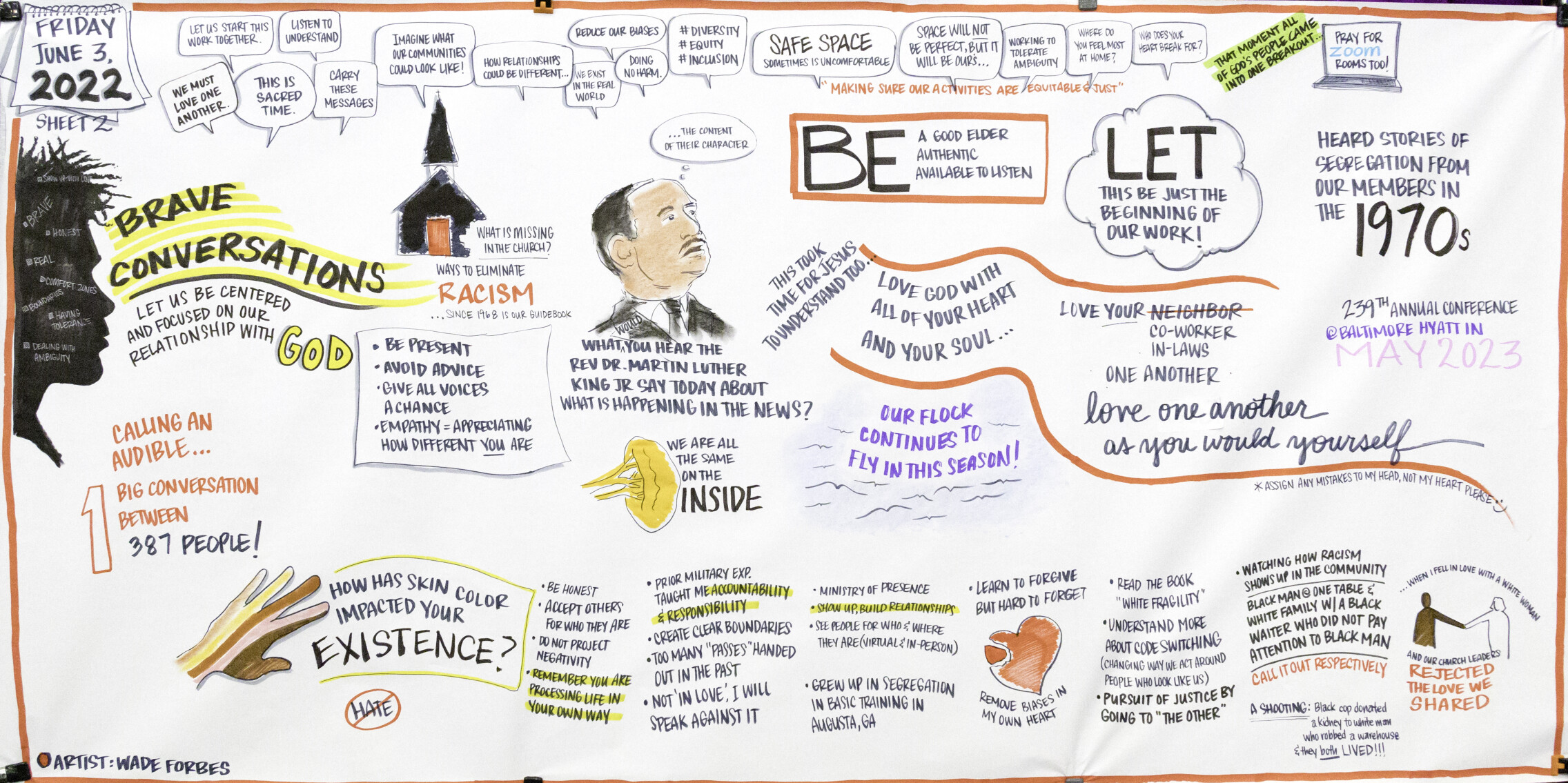Building Beloved Community

“Which commandment is the first of all?”Jesus answered, “The first is, ‘Hear, O Israel: the Lord our God, the Lord is one; you shall love the Lord your God with all your heart and with all your soul and with all your mind and with all your strength.’The second is this, ‘You shall love your neighbor as yourself.’ There is no other commandment greater than these.” - Mark 12: 28b-31, NRSV
I give you a new commandment, that you love one another. Just as I have loved you, you also should love one another.
- John 13:34, NRSV
A people of faith, the Beloved Community is an attainable state where injustice ceases and love prevails. It is inclusive, diverse, equitable, and embodies antiracism. It affirms our interrelated and interconnected humanity, is rooted in the love of God, neighbor and self, and is impacted by and concerned about the well-being of the other.
Learn More About Beloved Community
The term “Beloved Community” was coined by philosopher Josiah Royce to denote an ideal community and frequently used by Dr. King to describe a society of justice, peace and harmony which can be achieved through nonviolence. In his sermon at Dexter Avenue Baptist Church in Montgomery, Alabama, on April 2, 1957, Dr. King said, “The aftermath of nonviolence is the creation of the beloved community.”
According to the King Center, the Beloved Community was Dr. King’s global vision for all people to share in the wealth of the earth. In the Beloved Community, poverty, hunger and homelessness will not be tolerated because international standards of human decency will not allow it. Racism and all forms of discrimination, bigotry and prejudice will be replaced by an all-inclusive spirit of sisterhood and brotherhood. In the Beloved Community, international disputes will be resolved by adversaries’ peaceful conflict resolution and reconciliation instead of using military power. Love and trust will triumph over fear and hatred. Peace with justice will prevail over war and military conflict.
The Baltimore-Washington Conference is building beloved community through:
Learning
- The Unfinished Church Podcast focuses on the holy work of antiracism. Hosted by United Methodist Bishops LaTrelle Easterling, Michael McKee, and Gregory Palmer, the podcast is a place for dialogue, learning, and transformation as people of faith coming together to build a world in which racial prejudice has no power.
- Journey to Beloved Community Course: 6 Actions for Belonging and Becoming. Every moment we have a decision whether to create more inclusion, diversity, equity and antiracism (IDEA) or less. This 8-session course will focus on six actions that you and community partners can take to grow in building beloved community and hence create spaces of belonging and becoming. New class dates will be announced soon. Visit the JTBC webpage for more information.
- Multicultural Ministry that ensures that historically marginalized communities are intentionally strengthened.
- Cultural Humility and Awareness Resources to understand the process of ongoing self-reflection and self-critique.
ENGAGING
- Praying for Change: Daily Prayers for Anti-Racism
- The Brave Conversation Resourcers are a group of people trained to help congregations across the Baltimore-Washington Conference have brave conversations that contextually advance inclusion, diversity, equity, and antiracism.
- The People’s Supper, a grass-roots way of equipping and organizing brave conversations within a community with the goal of committing to making a difference the community needs in order to be more inclusive, diverse, equitable and antiracist. Contact Fathima Rifkey to locate a People's Supper near you.
- Racial Justice Team, a group that provides online resources and opportunities and meets monthly.
Taking Action
- We Rise United to Build Beloved Community is a strategic initiative to ensure embedding inclusion, diversity, equity and antiracism in leaders, communities and processes.
- Covenant to Create Beloved Community. Pledge your commitment to creating a culture of beloved community and do the work.
- Commitment to Embodying Antiracism. Sign the pledge and engage in all suggested actions. Additional antiracism resources may be found here.
- Legislative Action, where civic engagement on priorities identified by the BWC Advocacy and Action teams with a focus on antiracist public policies and legislation at the district, state and national level. Priorities for 2022-2023 reflect the UM Social Principles and Resolutions and include environmental justice, gun violence prevention, domestic violence, immigration reform, affordable and equitable housing, and health care for all. Contact Legislative Action Team chair, Will Newton, or Fathima Rifkey to get involved.

